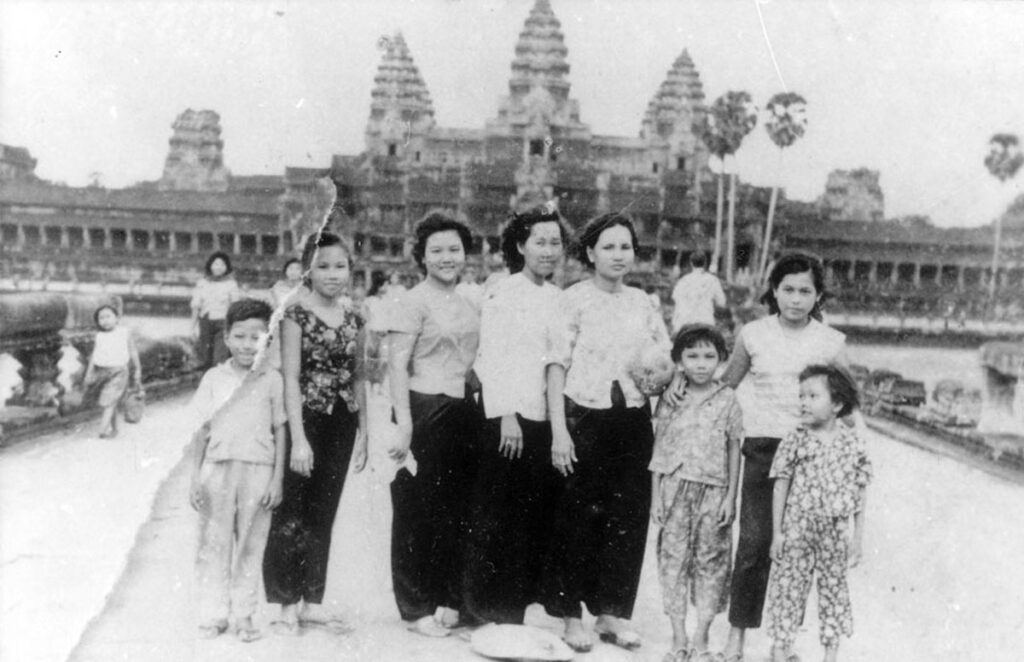When I was in high school in Phnom Penh, I liked sports and played basketball. My father supported my love of sports, and at one time, I was ranked as the second-best woman player in the country. After I graduated, I became a typist at the Seng Thai Company and continued living with my family. Our house was opposite a casino on the Chaktomuk River.
On April 17, my mom and dad were hastily preparing our belongings when two Khmer Rouge soldiers shouted at us, “Why are you taking so much time with your things? Do you want bombs to drop on you or what?” My mom, who had coronary disease, almost had a heart attack because of that rough shouting.
We headed south. Because it was the dry season, my younger brothers and sisters cried for food and water, which delayed our journey. My parents asked the Khmer Rouge soldiers, “Where shall we go?” “Just get out of city,” they replied. We stayed in a village for four or five days, waiting for the Angkar to call us back to Phnom Penh, and then went to Prey Veng Province. It was a very tiring journey and my parents were forced to exchange their valuables for food.
My older sister Po Tay found a small package of gold near the river bank. A few days later, she said goodbye to us and left with her husband; they were going to his hometown. That was the last time we ever saw them.
In Prey Veng, we were under the control of the local people. Some old people said that the situation was like the Buddhist saying, “There are houses for people to live in, but no one lives in the house. There are roads for people to travel, but no one travels.”
The Angkar was always educating us. Once, when my younger brother Sisophon had a high fever, he asked for permission to stay at home. He was refused, but eventually a cadre took him to the hospital in an ox cart. My parents wanted to take care of him there, but were told that “The Angkar is the parents. If children are sick, the Angkar can take care of them, so there is no need for their parents to visit.” My parents were quiet then, and only put their hands up to beg the Angkar’s pardon.
Two of my younger siblings, Sitha and Bannaka, were very lazy and did not complete the tasks assigned to them. Their unit chief re-educated my parents frequently because of this. The Angkar also blamed me: as an elder sister, I should have been responsible enough to educate my younger siblings.
Because we lacked food, our health grew dramatically worse. We hardly recognized one another, we were so thin. We were also covered with dirt and mud because we did not have soap. The local people taught us to dry mint leaves under the sun and mix them with clay. As a result, it would become potash and could be used as soap.
In 1976, the Angkar moved us to another district. My father became very sick, so my mother asked if we could to delay our trip until he recovered. Her request was refused and my father died. We didn’t have any material to cover his body with, except a towel.
The Angkar usually had three meetings per month. They posted a sign on the meeting house wall that said, “Viva! Victory! A prosperous Cambodian Liberation. Viva! Victory! Re-educate oneself to became a pure liberator. Viva! Victory! Determine to work hard for much more productivity for the great leap forward and to destroy all internal enemies to create a proletariat regime for eternity.” After each meeting, the unit chiefs divided people for smaller groups meetings where we criticized ourselves and each other, and were told to work hard for more productivity.
My brother Sisophon fell very ill in Prey Vent. His heart was hurting, probably from carrying too many heavy things. After he died, I looked in his clothing bag and saw his student identity card and a book. He kept it because he was hoping that one day he would return to school.
At the end of 1978, I heard the sound of gunfire and bombs from the east. People who secretly listened to radio whispered that the National Liberation Front would the coming soon. At that time, the Khmer Rouge cadres doubled up security and the killings began to increase rapidly. I told my younger siblings to strictly obey the Angkar’s rules so they could stay alive.
When the bombs and gunfire came very close, the Khmer Rouge cadres started to evacuate people to across the river. On December 30, 1978 I heard on the radio that Kratie was liberated. People shouted with excitement when they heard the news, and then started fighting over the rice in the mills. I got two cows and an ox cart for my mom to ride on.
The remaining members of my family began walking home. When we reached Kratie provincial town, the National Liberation Front authorities would not allow us to enter. My mother’s legs swelled up, and she tried to find a witch doctor to cure here so we could return to Phnom Penh. While she was being treated, I found work as a typist in the information office, and later got married. We have been living in Kratie ever since.

